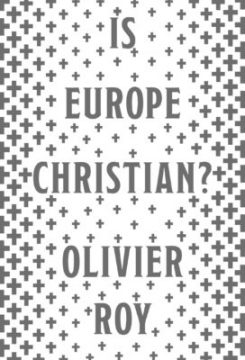 The Immanent Frame has a forum on Olivier Roy’s Is Europe Christian?, with comments from John R. Bowen, Agnès Desmazières, Nadia Fadil, Effie Fokas and Erin K. Wilson. Olivier Roy:
The Immanent Frame has a forum on Olivier Roy’s Is Europe Christian?, with comments from John R. Bowen, Agnès Desmazières, Nadia Fadil, Effie Fokas and Erin K. Wilson. Olivier Roy:
In the course of my research on the rooting of Islam in Europe, I studied the polemics that engulfed Europe and gave birth to a whole array of anti-migrant populist parties. This rooting was a consequence of a massive labor migration dating from the 1960s and the coming of age of second and even third generations of young Muslims who consider themselves Europeans. The populists as well as many rightist leaders first opposed a “Christian Europe” to a foreign religion. The polemic could be summed up in a single question: “Is Islam compatible with European values?” But logically such a question entailed another question: “What are European values?” It clearly appeared that most of the values that people contrast to Islam (feminism, gay rights, right to blasphemy) are at best not supported and at worst condemned by the Catholic Church and Protestant evangelicals in Europe. Of course, most of the established Protestant churches are far more liberal, but precisely because of this liberalism they are more open to accept Muslims. That is the paradox of Europe compared to the United States: US evangelicals who defend a Christian America advance Christian values and norms (against abortion, same sex marriage, etc.), while in Western Europe, at least, most of the populists endorse (and practice) liberal values in terms of family and sexual life. How do we explain this chiasm? How do Christian faith communities react to it? Why does the Catholic Church define European culture as having turned “pagan,” while many people who do not engage in any Christian religious practice still refer positively to a “Christian Europe”?
Most of the academic literature on the topic could be divided into two schools. One stresses the importance of the Enlightenment as a tool of secularization, leading to a more open, free, and hence modern society (this school consequently thinks that the problem of Islam is the absence of the “Enlightenment” moment). The other school stresses the translation of Christian norms and values into European secular culture (for instance, the importance of individualism or the sacralization of the state). For the second school, the problem of Islam is that it is not Christianity.
More here.
